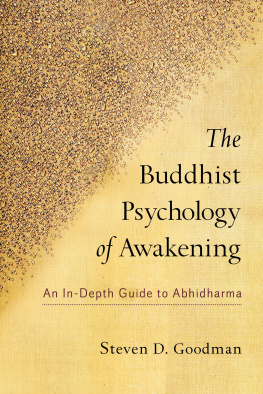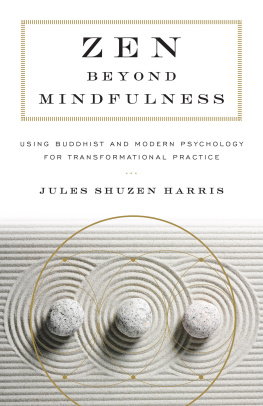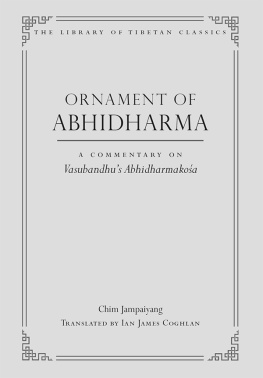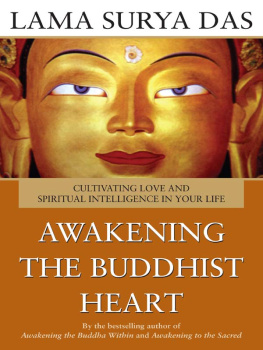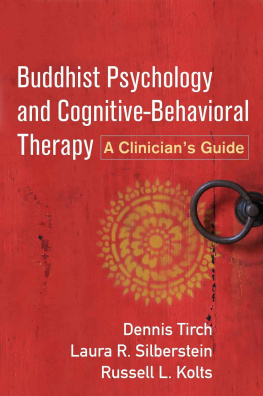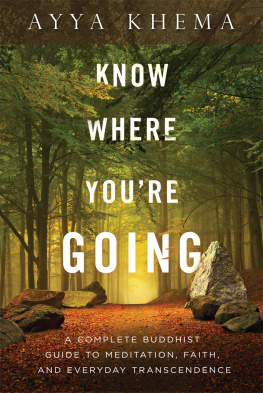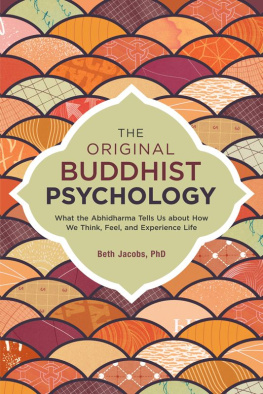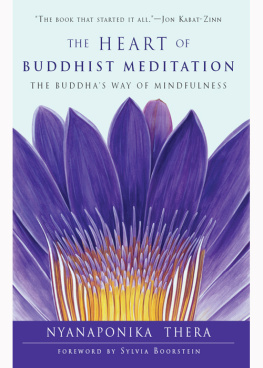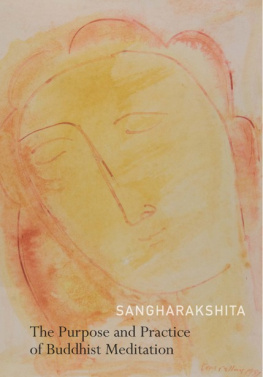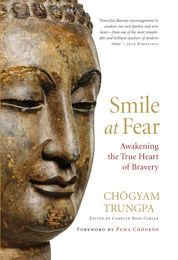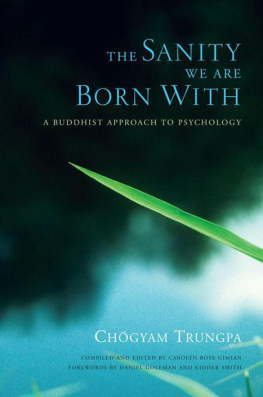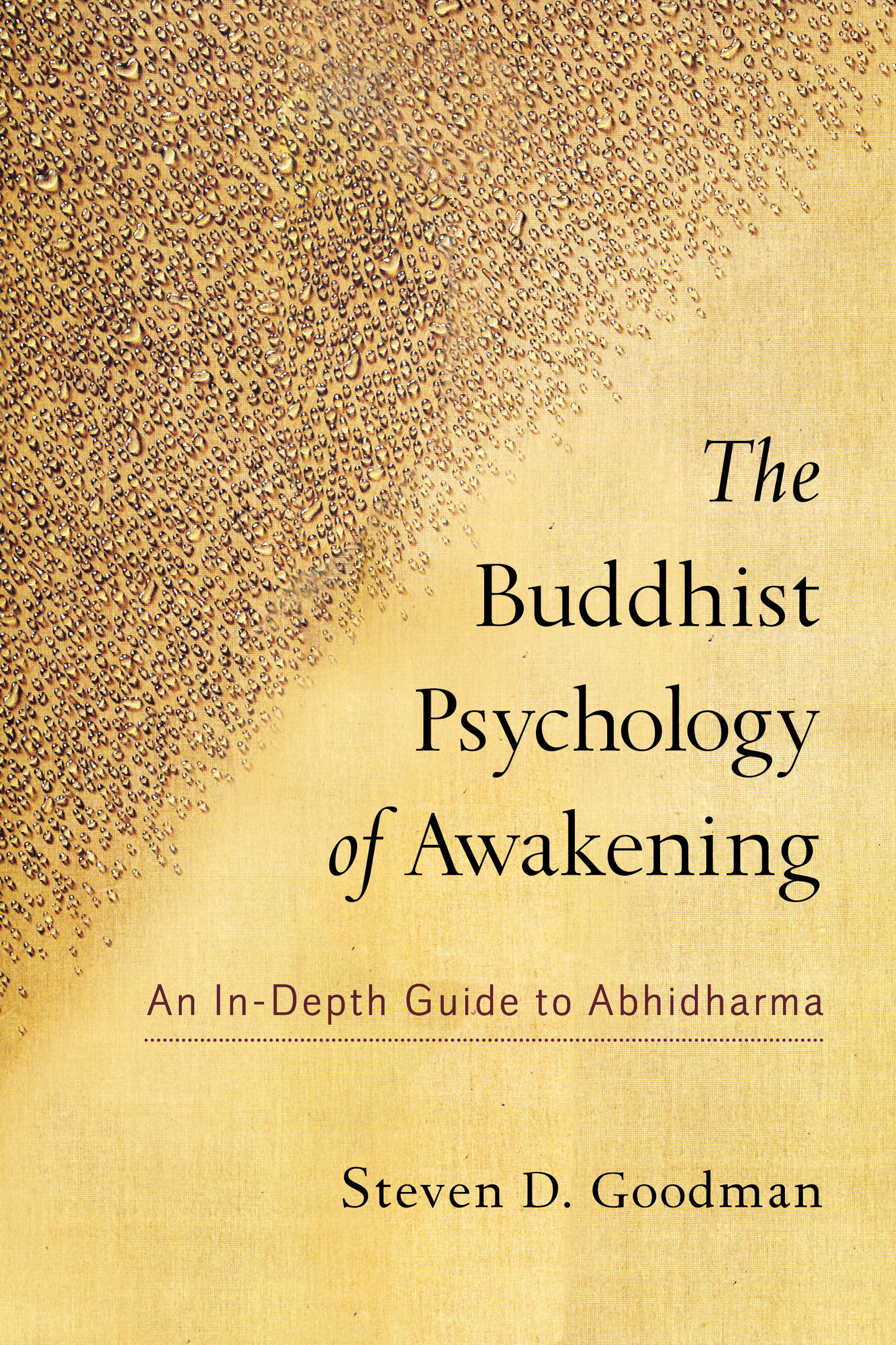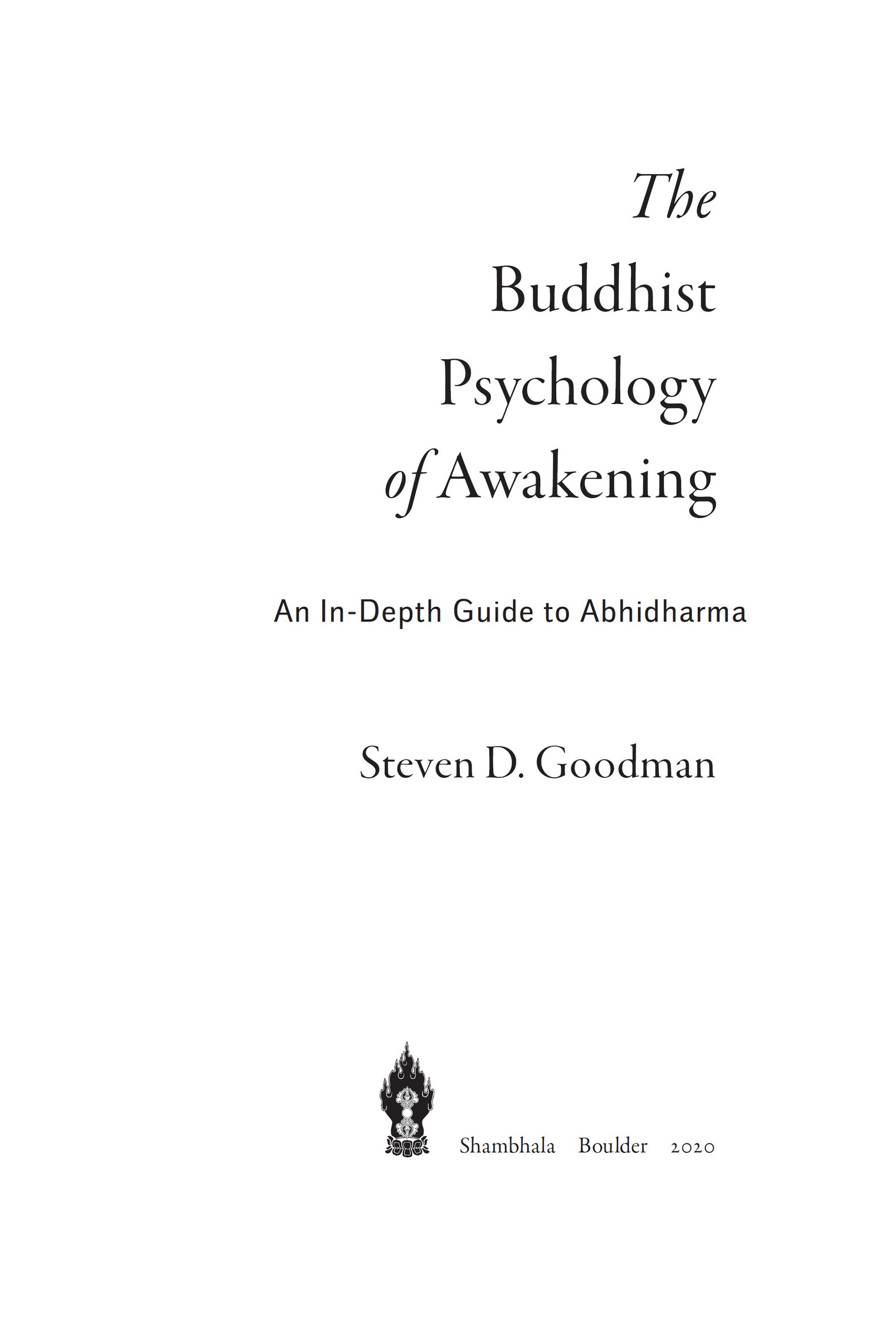Shambhala Publications, Inc.
2020 by Steven D. Goodman
All rights reserved. No part of this book may be reproduced in any form or by any means, electronic or mechanical, including photocopying, recording, or by any information storage and retrieval system, without permission in writing from the publisher.
Book design by Greta D. Sibley, adapted for ebook
Names: Goodman, Steven D., 1945 author.
Title: The Buddhist psychology of awakening: an in-depth guide to Abhidharma / Steven D. Goodman.
Description: First edition. | Boulder: Shambhala, 2020. |
Includes bibliographical references and index.
Identifiers: LCCN 2019014671 | ISBN 9781559394222 (pbk.: alk. paper)
Subjects: LCSH : Abhidharma.
Classification: LCC BQ 4195 . G 66 2020 | DDC 294.3/42dc23
Preface
A few words about the focus and origin of this book may help to orient the reader. First, the focus: For whom was this written? It was written primarily for those who have or might develop an interest in the very basic Buddhist teachings associated with what Tibetan traditions call the first turning of the wheel of the Dharma. Here, there are grouped teachings on proper conduct (vinaya), discourses (sutras), and commentaries (shastras), and the basic teachings that came to be gathered together under the rubric of Higher Dharma (Abhidharma). The teachings on Higher Dharma are, for the most part, rather technical, consisting of main points and enumerated lists of basic factors (dharmas) of phenomena mentioned in the sutras.
There is a rich codification of such teachings preserved in the early Pali Buddhist traditions and thereafter in the Theravadin Abhidharma literature. In addition, there is a different set of texts used by the living traditions associated with Indo-Tibetan Buddhist lineages, which is the focus of this book. These have been largely preserved in Sanskrit as well as in translation in Tibetan, Chinese, and Mongolian languages. Primary among these texts is the Treasury of Higher Dharma (Abhidharmakosha) by the fifth-century Indian Buddhist savant Vasubandhu.
My love of the Abhidharma was catalyzed by Emeritus Professor Jaini (University of California at Berkeley), who stressed that a thorough knowledge of the Abhidharma tradition should be the bedrock and starting point for all Buddhist studies. I hope that some glimmers of insight and humor, in spite of flaws in my understanding, may dawn in the minds of readers. Perhaps more importantly, I have also been inspired by the living tradition of Buddhist study and practice, and it is to that tradition and those lineages that I pay homage and gratitude. Scholars and those who are well versed in the original source materials may find this approach too cavalier. This book, therefore, is not aimed at the specialist who can read the original texts themselves. Rather, it is aimed at inviting a fresh look at this noble tradition; it is for those who might seek to refresh their view on Buddhist basics and then, perhaps, to actually apply that view in their practice.
The challenge is to find a way to present the main points of this rather encyclopedic compendium that might inspire and guide the curious modern reader into the profundity and nuances of an Abhidharma approach to the view and practice of the Buddhadharma. I have chosen to give an account, based on the compendium itself and the Tibetan commentaries and summaries based upon it, that strives to bring out a lively, relevant, and what might be considered a somewhat novel way to actually apply some of the key approaches of the Higher Dharma for a contemporary nonspecialist readership.
One might ask how the technical language of a fifth-century tradition on the Buddhadharma can provide something relevant for modern times? I have tested and refined the material in this book and have placed a primary emphasis on using conversational, casual, and nontechnical language in order to show, using everyday examples, how some of the central insights of Abhidharma might still be accessible and useful to those who approach the study and practice of the Buddhadharma in contemporary times.
Of course, there will be errors of fact, but hopefully the spirit of inquiry is faithful to Vasubandhu and his heirs. The reader will note that I refer, here and there, to Tibetan Buddhist teachers to make certain points. I do this, in part, because these teachings are vibrant and thriving in the living lineages that they transmit, and I myself continue to be inspired by such examples.
The Origins of This Book
Many years ago, at the newly established Nyingma Institute in Berkeley, California, the head Tibetan Buddhist teacher Tarthang Tulku urged me to begin an intensive study of what was then available of the Abhidharma literature in European languages. To that end, I prepared a rough translation from the French of the Abdhidharma section of Etienne Lamottes LHistoire du Buddhisme Indien, which is now available in English translation. Then I delved into a study of Louis de la Valle-Poussins French translation of Vasubandhus Kosha, entitled LAbhidharmakosha, now also available in English translation by Pruden (1991). This background work was soon supplemented by a study of the Tibetan translations of Vasubandhus work, works written in Tibetan as commentaries on the Kosha, and works written by Indian commentators. Finally, I was led to study and translate key portions of Ju Mipham Rinpoches Gateway to Knowledge and the commentary on it by Kathog Khenpo Nuden. This text by Mipham is now also available in English in full, translated by Erik Pema Kunsang.
What I culled from these studies was a desire to present key points of view to eager graduate students at the Graduate Theological Union in Berkeley, via its affiliation with the newly established Nyingma Institute. These students were bright and engaged and asked many questions about the diverse categories of dharmas and their arrangement into conditioned and unconditioned. They also asked what any of this had to do with the foundational teachings of the Buddhadharma, such as the four noble truths (suffering, the causes of suffering, the cessation of suffering, and the path leading to the cessation of suffering). From the very beginnings of teaching this material, we explored the possible implications for what emerged as what we might call a special kind of Buddhist psychology and how such study might inspire and provoke a new way forward into foundational and transformational practices.
Sometime after those initial presentations, I was invited to explore these approaches at the Naropa Institute (now Naropa University) in Boulder, Colorado, to a lively and engaged group of Buddhist students. In subsequent years, and through many refinements, this material was taught in courses at the California Institute of Integral Studies in San Francisco and at a summer study program at the Rigpa Shedra in Southern France.
Thus, what you have before you is a reworked and edited presentation of these lectures and teaching materials that are based on the Indo-Tibetan textual traditions of Abhidharma. I hope some of these novel approaches may prove to be beneficial in presenting a coherent introduction to the depth and precision of Abhidharma methods to the study of Buddhadharma. Finally, I hope that the light and conversational tone of this book will be inviting to all.

